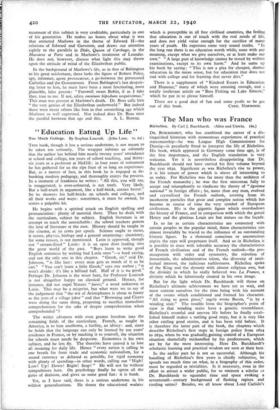" Education Eating Up Life"
Too Much College. By Stephen Leacock. (John Lane. 7s. 6d.)
Tins book, though it has a serious undertone, is not meant to be taken too seriously. The wrapper informs us solemnly that the author has behind him nearly twenty years' attendance at school and college, ten years of school teaching, and thirty- six years as a professor at McGill : in four years of retirement he has gathered for us the ripe fruit of so long an experience. But, as a matter of fact, in this book he is engaged in de- bunking modern pedagogy, and thoroughly enjoys the process. In a moment of frankness he writes : " All this, you will say, is exaggerated, is over-coloured, is not truth. Very likely. But a half-truth in argument, like a half-brick, carries better." So he showers his half-bricks on schools and colleges, and all their works and ways : sometimes, it must be owned, he scores a palpable hit.
He begins with a spirited attack on English spelling and pronunciation: plenty of material there. Then he deals with the curriculum, subject by subject. English literature is an attempt to teach the unteachable: the school teachers poison the love of literature at the root. History should be taught in the cinema, at 5o cents per epoch. Science ought to mean, it seems, physics, biology and a general smattering : chemistry, for some reason, is not mentioned. Latin is approved, though not " stream-fined " Latin: it is an open door leading into the great world of the past. " Boys learn to write good English sentences by writing bad Latin ones "—a hard saying, and not the only one in this chapter. " Greek, sir," said Dr. Johnson, " is like lace : every man, gets as much of it as he can." " You can't learn a little Greek," says our author ; " it won't divide : it's like a billiard ball. Half of it is no good." Perhaps Dr. Johnson is the wiser here, for Professor Ledcock is not altogether happy on classical ground. Horace, for instance, did not expel Nature "furco," a word unknown to Latin. This may be a misprint, but what were we to say of the judgement that " the wit of Aristophanes is about as funny as the jests of a village joker " and that " Browning and Cicero were doing the same thing, proposing to sacrifice immediate comprehension for the sake of deeper comprehension when comprehended "?
The writer advances with even greater freedom into the remaining fields of the curriculum. French, as taught in America, is to him anathema, a futility, an idiocy : and, since he holds that the language can only be learned by ten years' residence in France, or by teaching it to yourself, the situation for schools must needs be desperate. Economics is his own subject, and he lets fly. The theorists have caused it to lose all meaning for daily life. Hence " every nation is calling in one breath for freer trade and economic nationalism, for a sound currency as debased as poisible, for rigid economy with plenty of spending—in other words, calling out " High! Low ! Up! Down! Begin! Stop! " He will not be without sympathisers here. On psychology finally he opens all the gates of derision, and gives us some good fun: it is bunk.
Yet, as I have said, there is a serious undertone in his wildest generalisations. He shares the educational malaise which is perceptible in all free civilised countries, the feeling that education is out of touch with the real needs of life, and does not yield value enough for the sacrifice of many years of youth. He expresses some very sound truths. " In the long run there is no education worth while, none with any meaning, except what we give ourselves, or at least make our own." " A large part of knowledge cannot be tested by written examinations, except to its own harm." And he sums up his book by saying : " This is not a plea for cheaper, shorter education in the mean sense, but for education that does not end with college and for learning that never dies."
There is a supplement of " Kindred Essays in Education and Humour," many of which were amusing enough, and a totally irrelevant article on " Bass Fishing on Lake Simcoe," which he put in to please himself.
There are a good deal of fun and some profit to be got






































 Previous page
Previous page